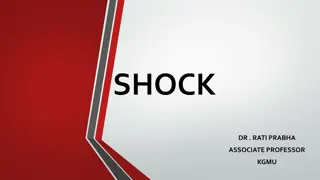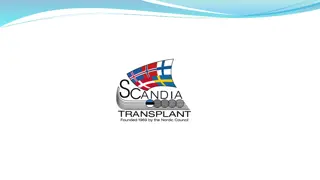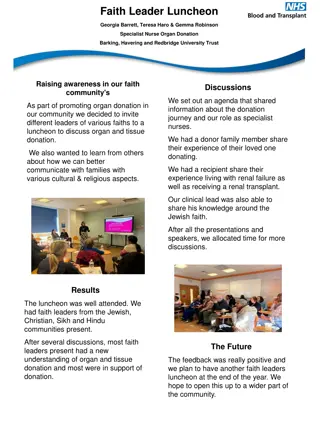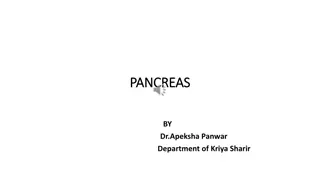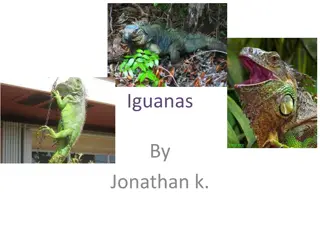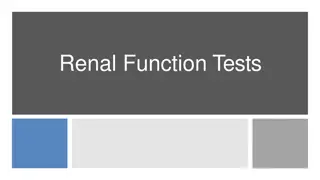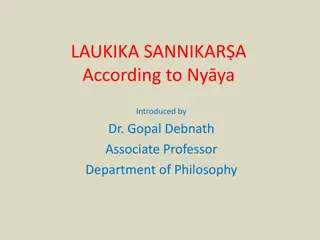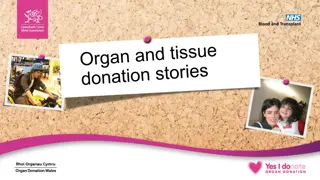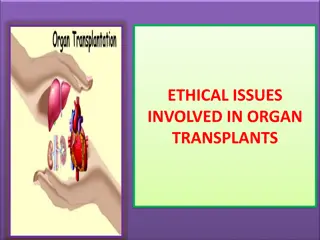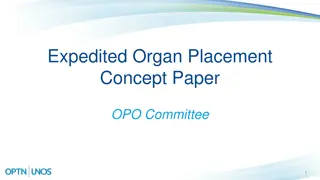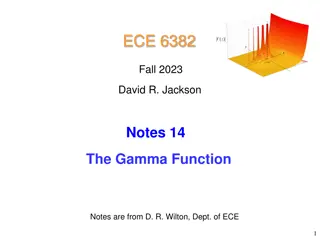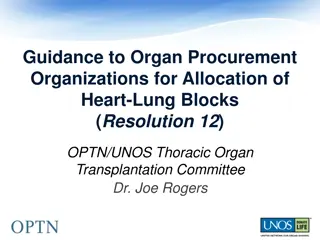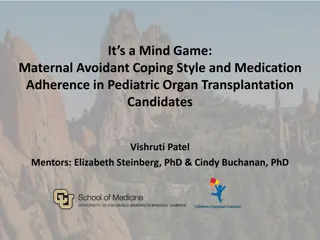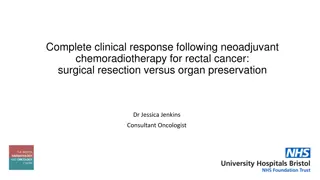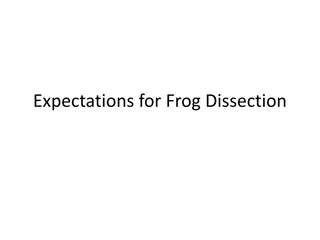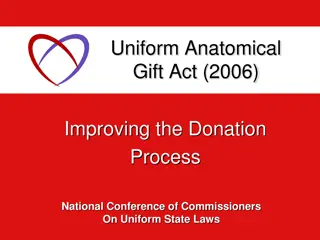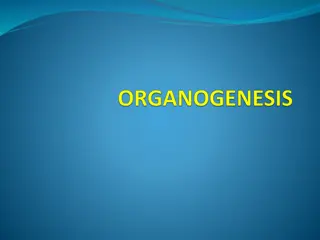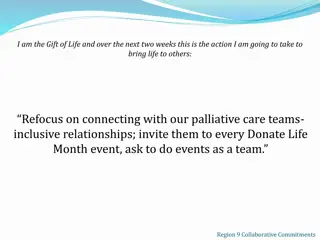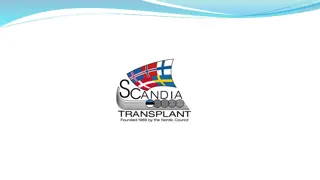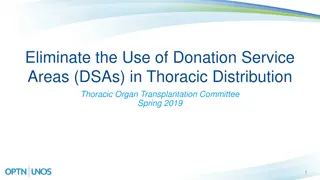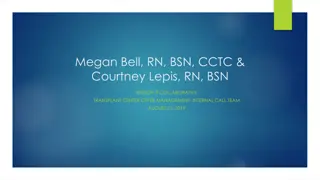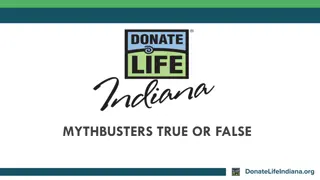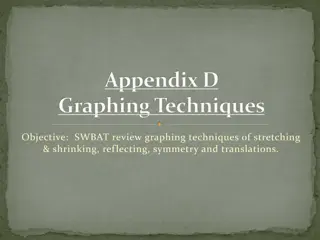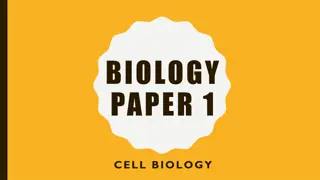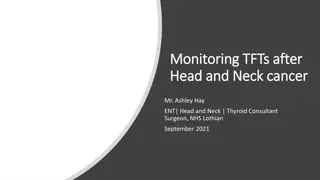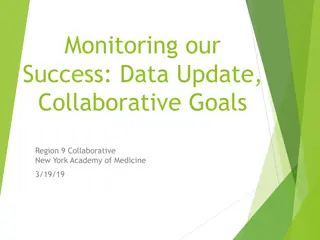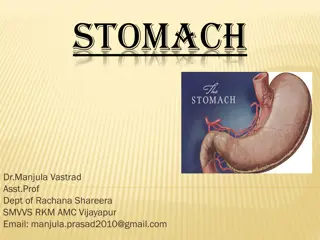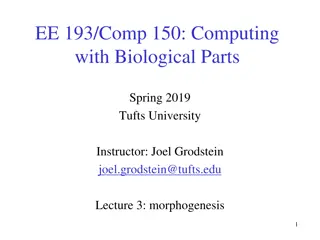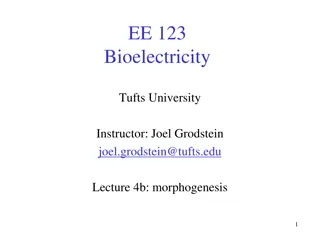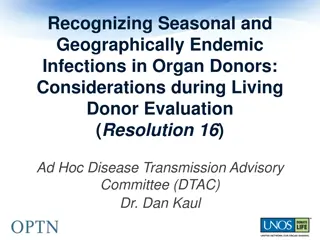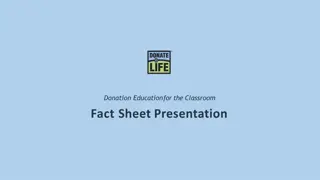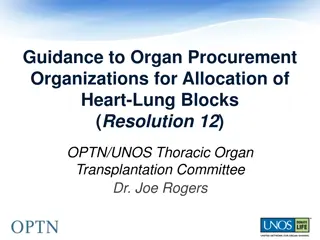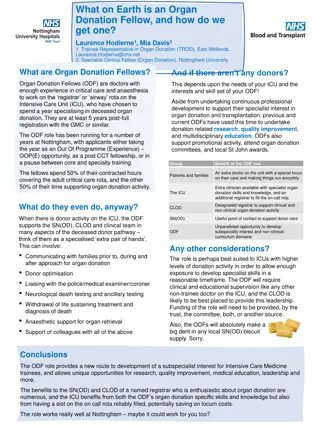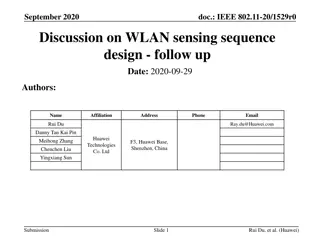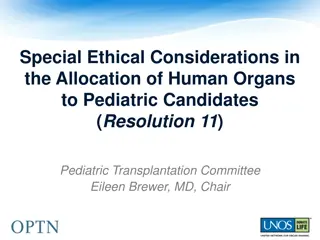Understanding Shock: Causes, Symptoms, and Stages
Shock is a critical condition caused by an imbalance between cellular oxygen supply and demand, leading to organ dysfunction. Compensatory responses include increased heart rate, vasoconstriction, and hormonal adjustments. Recognizable features of shock include tachycardia, hypotension, cool clammy
3 views • 27 slides
Should We Allow a Market for Transplant Organs?
Analyzing the dilemma of organ shortages in the US, this content explores the ethical dimensions of creating a market for transplant organs. Through discussions on economics, ethics, and decision-making processes in allocating scarce organs, it delves into the complexities of determining who should
0 views • 22 slides
Understanding Organ Donation in Hong Kong
Explore the various aspects of organ donation in Hong Kong, including suitable organs for donation, living and cadaveric donation processes, low donation rates, common misconceptions, and how to register as an organ donor through the Centralised Organ Donation Register. Discover the opt-in and opt-o
3 views • 28 slides
Scandiatransplant Activities and Awards in 2023
Scandiatransplant is the organ exchange organization serving Denmark, Finland, Iceland, Norway, Sweden, and Estonia. They facilitate kidney, liver, thoracic, pancreas, and islet transplantations. The organization aims to maintain transparency and ethical practices while operating a common waiting li
2 views • 45 slides
Engaging Our Community: Organ Donation Initiatives and Success Stories
Two impactful initiatives in the healthcare sector aimed at promoting organ and tissue donation within communities are highlighted. The first initiative involves hosting luncheons with faith leaders to educate and raise awareness, resulting in increased support for donation. The second initiative sh
0 views • 4 slides
Comprehensive Overview of Pancreas Function and Structure
Pancreas is a vital organ in the abdomen with dual exocrine and endocrine functions. As an exocrine organ, it secretes digestive enzymes and bicarbonates into the duodenum for food breakdown. In its endocrine role, the pancreas regulates blood sugar levels by secreting insulin, glucagon, somatostati
1 views • 16 slides
Fascinating Facts About Iguanas: From Skills to Survival
Iguanas, part of the Iguanidae family, are unique reptiles with special skills like tree climbing and predator evasion. They face threats due to human consumption and environmental hazards, such as oil spills for marine iguanas. Their sensory organ, Jacobson's organ, helps them navigate their surrou
0 views • 10 slides
Effectiveness of Steroids in COVID-19 Treatment: Insights from Recent Studies
Recent studies delve into the impact of different steroids on mortality and organ support in hospitalized COVID-19 patients. The use of dexamethasone showed a significant reduction in 28-day mortality, especially in patients requiring oxygen support. On the other hand, the REMAP-CAP trial assessed t
1 views • 6 slides
Understanding Renal Function Tests and Kidney Health
Renal function tests are essential for diagnosing and monitoring kidney health. These tests assess functions like glomerular filtration, tubular reabsorption, and endocrine functions of the kidneys. Common indicators include serum urea, creatinine levels, and more. It's crucial to evaluate renal fun
0 views • 34 slides
Understanding Perception in Nyaya Philosophy: An Introduction to Laukika Sannikara
Nyaya philosophy defines perception as knowledge arising from the contact between a sense organ and its object, known as Sannikara. This contact can be direct or indirect, leading to various kinds of Sannikaras such as Sayoga, Sayokta-samavya, Samaveta-samavya, Samavya, and Viśeṣa-viśeṣabhāva
2 views • 10 slides
Organ Donation Awareness and Education Activities
Explore the importance of organ donation through engaging activities, such as quizzes on organ and tissue donation facts and myths. Learn about the various organs and tissues that can be donated, the significance of registering on the NHS Organ Donor Register, and the impact of organ donation in sav
1 views • 26 slides
Ethical Issues in Organ Transplants
Organ transplantation involves the moving of organs from one body to another to replace damaged or absent organs. The process includes cadaveric and living organ donations, with various transplantable organs like lungs, kidneys, heart, and more. There are ethical issues surrounding organ donation de
0 views • 16 slides
Expedited Organ Placement Concept Paper - Addressing Critical Transplant System Issues
This concept paper outlines a proposal to address key challenges in the current organ transplant system, such as lack of transparency and consistency in organ placement. The focus is on developing an expedited placement system with specific triggers and qualifications to improve access to organs for
0 views • 9 slides
Introduction to Gamma Function and Equivalent Integral Forms
The Gamma function is a versatile mathematical function that generalizes the factorial function to non-integer and complex values. It has various integral definitions such as the Euler-integral form. The proof of the factorial property of the Gamma function is demonstrated through analytical continu
1 views • 20 slides
National Histopathology Service for Organ Retrieval and Transplantation - Audit Findings
The need for a national histopathology service for organ retrieval and transplantation is highlighted, with a focus on the importance of histopathological analysis in assessing donor organ quality and identifying lesions for further investigation. The audit findings show the incidence of urgent hist
0 views • 17 slides
Enhancing Heart-Lung Allocation Policy for Organ Transplantation
This project focuses on improving the allocation of heart-lung blocks for organ transplantation by providing clear guidelines to Organ Procurement Organizations (OPOs). The goal is to ensure consistent practices among OPOs across the country, promoting fairness and efficiency in organ allocation. Th
0 views • 11 slides
Understanding Maternal Avoidant Coping and Medication Adherence in Pediatric Organ Transplant Candidates
Maternal avoidant coping styles may impact medication adherence in pediatric organ transplantation candidates. Challenges in the field include organ shortage, patient non-adherence, and identifying health risk factors for effective organ allocation. Parents' coping behavior factors of stress include
0 views • 14 slides
Comparison of Surgical Resection vs. Organ Preservation after Neoadjuvant Chemoradiotherapy for Rectal Cancer
In the management of rectal cancer, the debate between surgical resection and organ preservation after neoadjuvant chemoradiotherapy is ongoing. While surgical resection is highly effective, the watch-and-wait strategy offers benefits such as avoiding permanent stomas and improving quality of life.
1 views • 14 slides
Frog Dissection Expectations and Procedures
Instructions for a frog dissection including preparation, tool usage, cutting techniques, organ exploration, and cleanup procedures. Students are guided on safety measures, dissection methods, organ identification, and proper cleanup steps after the activity. Detailed visual aids accompany each step
0 views • 6 slides
Modernizing Organ Donation Laws: The Uniform Anatomical Gift Act of 2006
The Uniform Anatomical Gift Act (UAGA) of 2006 aims to enhance the donation process by introducing new definitions, emphasizing personal autonomy, and providing clearer rules. It addresses the need for uniformity, updates to reflect current practices, and modernizes the Act to ensure a smoother orga
0 views • 14 slides
Understanding Organogenesis in Plant Tissue Culture Techniques
Plant regeneration through tissue culture techniques such as organogenesis plays a vital role in micropropagation and organ production. Factors affecting organogenesis include donor plant growth, culture medium, growth regulators, and environmental conditions. Chemical regulation and the use of epid
0 views • 10 slides
Ethical Considerations in Organ Donation for Neurologically-Aware Patients
This information highlights the process of honoring the desire of neurologically-aware patients to donate organs after circulatory death. It discusses the referral, legal authorization, triggers for consideration, and ethical aspects involved in approaching and discussing organ donation with the pat
0 views • 15 slides
Bringing Life Through Organ Donation: Two-Week Action Plan
Over the next two weeks, the Gift of Life aims to refocus on connecting with palliative care teams, educate ICU staff on the importance of early referrals, raise awareness in the Caribbean community about organ donation, coordinate information sessions with OPO liaisons, and encourage colleagues to
0 views • 64 slides
Overview of Scandiatransplant Activities and Purpose
Scandiatransplant is the organ exchange organization for Denmark, Finland, Iceland, Norway, Sweden, and Estonia, serving a population of about 29.1 million. Its purpose is to facilitate organ exchange transparently and ethically among its member hospitals. The organization covers various transplanta
0 views • 45 slides
Proposal to Remove Donation Service Areas in Thoracic Organ Transplantation
The proposal aims to ensure compliance with regulations by eliminating Donation Service Areas (DSAs) in thoracic organ allocation policies. The suggested solutions involve replacing DSAs with a 250 NM distance from the donor hospital, removing language allowing prioritization of sensitize heart cand
0 views • 10 slides
Organ Offer Management at Keck USC Transplant Institute
Keck USC Transplant Institute is a multi-organ transplant center with a dedicated team managing organ offers. The team structure includes RN-Transplant Coordinators, Call Team Managers, and Donor Allocation Specialists. They handle a range of tasks from reviewing offers with physicians/surgeons to p
0 views • 18 slides
Organ Donation and Transplantation Myths True or False
Explore common myths and facts about organ donation and transplantation through a fun true or false game. Learn the truth behind misconceptions like who can be a donor, the possibility of brain transplants, where to register as a donor, fairness in organ allocation, and the impact on funeral arrange
1 views • 14 slides
Overview of Graphing Techniques and Functions
Explore graphing techniques including stretching, shrinking, reflecting, symmetry, translations, and various types of functions such as the identity function, square function, cube function, square root function, cube root function, and absolute value function. Understand vertical and horizontal shi
0 views • 25 slides
Cell Biology Overview and Organ Systems in Biology Paper 1
The Biology Paper 1 content covers topics such as cell specializations, cell division, organelles, enzyme functions, and organ systems including the cardiovascular system. It discusses key concepts like stem cells, mitosis, diffusion, osmosis, active transport, and various cell components such as nu
0 views • 8 slides
Monitoring Thyroid Function After Head and Neck Cancer Treatment
This collection of images and data discusses the importance of monitoring thyroid function after head and neck cancer treatment, specifically focusing on post-treatment thyroid function tests, audits of practices in head and neck units, thyroid function post laryngectomy, and the significance of det
1 views • 11 slides
Organ Donation Collaborative Data Update and Goals Review
The data update and collaborative goals review for the Region 9 Collaborative at the New York Academy of Medicine includes information on national data for total donors and transplanted organs from 2014 to 2018. The goals of the collaborative focus on enhancing organ donation rates and achieving spe
0 views • 9 slides
Understanding the Anatomy of the Stomach
The stomach, also known as the gaster or venter, is a vital organ in the digestive system. It is a muscular bag that plays a crucial role in food digestion and absorption. This article covers the surface anatomy, external and internal features, blood supply, nerve supply, lymphatic drainage, clinica
0 views • 32 slides
Exploring Morphogenesis and Regenerative Medicine in Computing with Biological Parts
This course delves into the intriguing world of morphogenesis, focusing on how cells express proteins based on their environment and the potential applications in regenerative medicine. Through studying animals' abilities, hypothesizing algorithms, and exploring bioelectricity, the course aims to un
0 views • 49 slides
Exploring Bioelectricity and Regenerative Medicine in Morphogenesis
Delve into the fascinating world of bioelectricity, regenerative medicine, and morphogenesis as discussed by Joel Grodstein in EE.123 at Tufts University. Discover the origins of bioelectricity, its relevance in neuronal functions, cardiac bioelectricity, and its role in morphogenesis. Explore the p
0 views • 53 slides
Guidance on Recognizing Seasonal and Geographically Endemic Infections in Organ Donors
This proposal aims to provide guidance for identifying and testing potential living organ donors for seasonal and geographically endemic diseases, such as Histoplasmosis, Chagas, and West Nile Virus. The strategic plan focuses on promoting transplant patient and living donor safety by evaluating ris
0 views • 9 slides
Organ, Eye, and Tissue Donation: Facts and Education for the Classroom
Explore essential information on organ, eye, and tissue donation, including common questions, the impact of donation, and how to register as a donor. Learn about the waiting list for transplants, the significance of eye donation, and the process of becoming a donor to save lives. This fact sheet pre
0 views • 11 slides
Optimization of Heart-Lung Allocation Policy for Organ Procurement Organizations (OPOs)
This document provides guidance to Organ Procurement Organizations (OPOs) regarding the allocation of heart-lung blocks, focusing on resolving issues related to Policy 6.5.E. The aim is to establish clear policies and principles to ensure consistent allocation practices among OPOs nationwide. Throug
0 views • 11 slides
Understanding the Role of Organ Donation Fellows in Intensive Care Units
Organ Donation Fellows (ODFs) are experienced doctors specializing in deceased organ donation, spending time on the ICU rota and supporting organ donation activities. They assist in donor optimization, communication with families, and organ retrieval, benefiting both ICU patients and the healthcare
0 views • 4 slides
Analysis of WLAN Sensing Sequence Design Using Ambiguity Function and Range-Doppler Map
In this document, the authors from Huawei discuss the analysis of employing the ambiguity function for WLAN sensing sequence design. They delve into the ambiguity function's definition, analysis, and its comparison with the range-Doppler map. The document highlights the importance of ambiguity funct
0 views • 15 slides
Ethical Considerations in Pediatric Organ Allocation
Addressing the lack of an ethical framework for pediatric organ allocation, this project aims to provide evidence-based support for prioritizing pediatric candidates. By collaborating with experts and committees, the goal is to establish a permanent framework that respects ethical and clinical judgm
0 views • 11 slides
